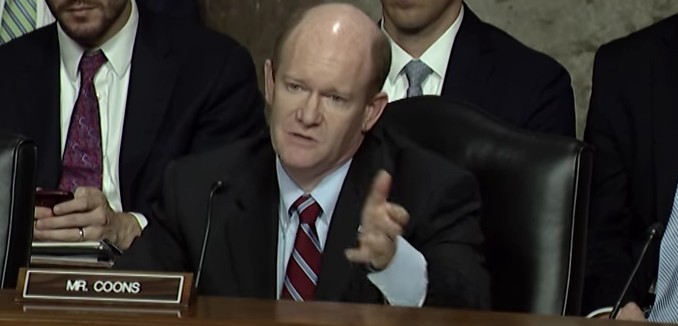Sen. Chris Coons (D – Del.) questioned the American negotiating team behind the recently concluded nuclear deal with Iran, known as the Joint Comprehensive Plan of Action (JCPOA), over the agreement’s weaknesses at a Senate Foreign Relations Committee hearing yesterday.
Addressing Secretary of State John Kerry, Coons asked if the joint commission, which was established by Iran and the P5+1 nations to determine whether the nuclear agreement was being properly implemented, could be relied on to penalize Iranian violations in the face of unraveling sanctions and an influx of European investment.
… I don’t mean to impugn the partnership of our vital allies who’ve gotten us to this point, but I am concerned that CEOs from many European nations are already winging to Tehran and talking about significant economic relationships. Should we be nervous about the votes in the future on that joint commission of the EU or our other allies given what, I suspect, will be significant economic interests that might inspire them to either direct the EU to vote against access or block access for us? How confident can we be of our allies’ enduring support of our interests in the likely event of cheating?
In response, Secretary of State John Kerry responded that he was “very confident” in the commission. Later he elaborated, “we’ve created a one nation ability to go to the Security Council and affect ‘snap back.'”
However, Mark Dubowitz, executive director of the Foundation for Defense of Democracies, explained to NPR that the “snap back” mechanism would not work so cleanly:
But critics of the deal see a big catch: “Iran actually has its own snap-back,” says Mark Dubowitz, sanctions expert at the Foundation for Defense of Democracies, which has been campaigning against what it calls a flawed agreement.
What he means is that, if sanctions are reinstated in part or entirely, the deal states that Iran could treat that as grounds to end its cooperation in part or entirely. In other words, if the U.S. wants to slap sanctions back on, it risks giving Iran an out to the deal.
The relevant paragraph in the JCPOA (.pdf) that establishes what Kerry called the “one nation ability” to snap back sanctions also states that, “if sanctions are reinstated in whole or in part, Iran will treat that as grounds to cease performing its commitments under this JCPOA in whole or in part.”
Coons later addressed Iran’s advanced centrifuge research, asking Energy Secretary Ernest Moniz, “How long did it take Iran to master the IR-1 centrifuge? What’s the difference in performance between the IR-1 and the IR-8? And how long do you think it will take Iran, given the restrictions of this agreement if observed to master the IR-6 and 8? And what would the impact be on their ability to enrich after years 10 to 15?”
After Moniz described the IR-6 centrifuge as being 7 to 8 times more powerful than the IR-1, and the IR-8 centrifuge to be 15 times more powerful, Coons asked whether in 10 years Iran is expected to be enriching uranium 15 times faster than it is today. Moniz answered, “…with this schedule we don’t think they will have, be anywhere near ready for industrial scale deployment of those machines. Certainly not in the decade and for some years thereafter.”
However, in Senate testimony (.pdf) last month, former weapons inspector and president of the Institute for Science and International Security David Albright said that allowing Iran to research advanced centrifuges was a major flaw in the deal:
The weakness of provisions limiting centrifuge research and development (R&D) during the first ten years of the agreement.
– No bans exist on Iran’s research and development of the IR-6 and IR-8 centrifuges, the latter of which is up to 16 times more powerful than the IR-1 centrifuge. Failing to achieve such bans, the interim agreement does not appear to mitigate the risks of Iran being able to deploy these more powerful centrifuges after year 13, other than some negotiators stating that they believe that Iran will have trouble actually deploying them in the future.
Last week, Albright told Eli Lake of Bloomberg View that he was surprised that Iran would be allowed to develop advanced centrifuges, and that their installation “would allow Iran to lower its break-out times down to days or a few weeks.”
[Photo: U. S. Senator Chris Coons / YouTube ]




